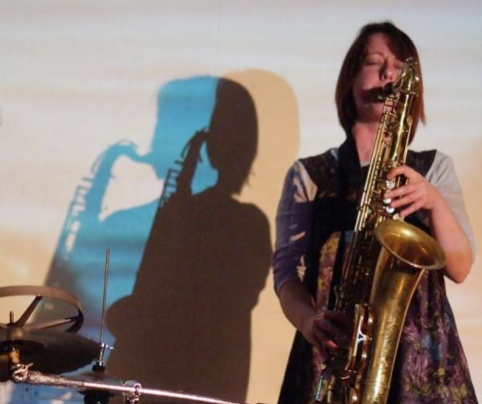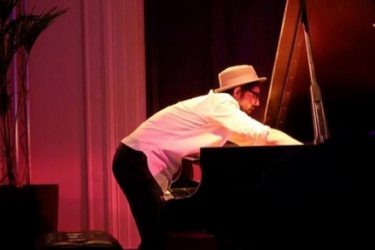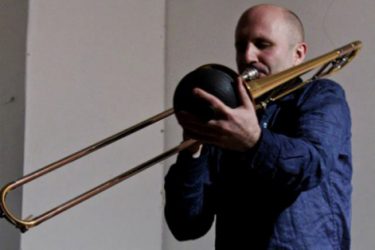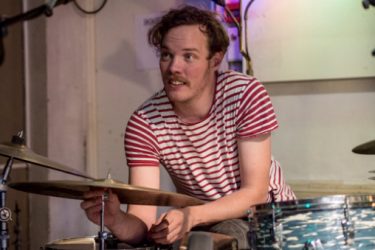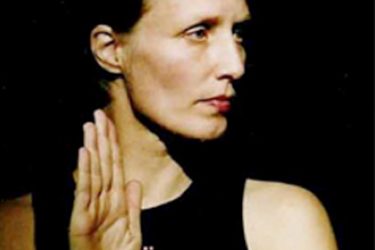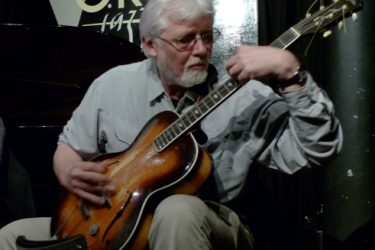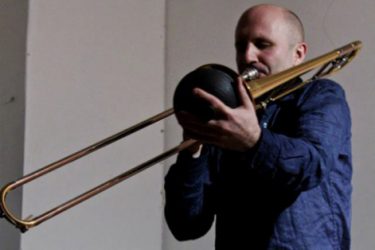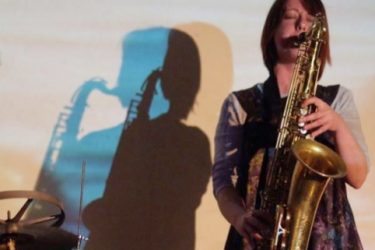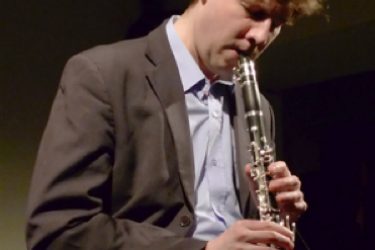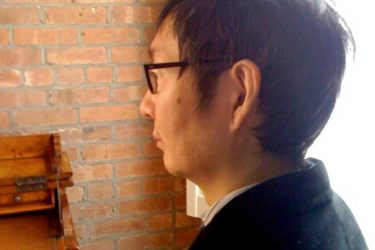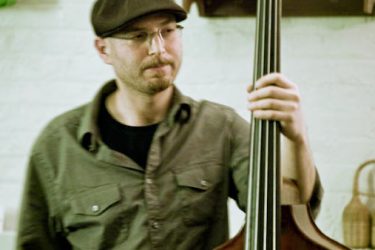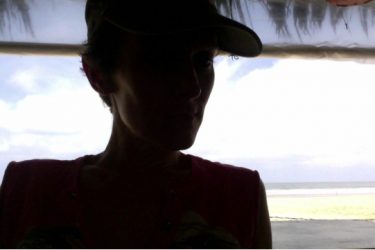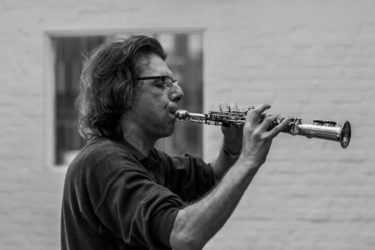Three nights of cutting edge improvised music directed by guitarist and Mopomoso founder John Russell.
Each night will begin and end with a short ensemble piece with all of the musicians, with a changing programme of smaller combinations throughout. Rest assured no two nights will be the same.
The Musicians
JJ Duerinckx (saxophone) Belgium
Alice Eldridge (cello) UK
Carl Ludwig Hubsch (tuba) Germany
Ken Ikeda (electronics) Japan
Adam Linson (bass/electronics) Canada
Edward Lucas (trombone) UK
Rachel Musson (saxophone) UK
John Russell (guitar) UK
Paul G Smyth (piano) Ireland
Ståle Liavik Solberg (drums/percussion) Norway
Alex Ward (clarinet) UK
Ute Wassermann (voice) Germany
JJ Duerinckx (saxophone) Belgium
Following an initial inspiration from Steve Lacy and meetings with Lol Coxhill
and Michel Doneda JJ Duerinckx decided to specialise on using the
sopranino saxophone in freely improvised music. He is an instigating member
of the concept One Moment Free Improv… a set of events around free
improvisation in Brussels and is also a sound artist mainly influenced by
Murray Schaffer. He also plays the baritone saxophone in alternative/
experimental and free jazz bands. Examples of his work can be found here:
Alice Eldridge (cello) UK
Depending upon who is asking, Alice Eldridge is an improvising cellist,
producer or researcher in biologically-inspired systems and sound. She has a
PhD in cybernetically-inspired software for improvisation from University of
Sussex, where she lectures in Generative Creativity. Following a few years
performing with her solo cello-laptop AV duo Alice and her Self-Karaoke
Machines, she presently favours improvising with humans: as one quarter of
PRSF Women Make Music awardees Collectress, as one half of Duot with
bass player Seth Bennett and as a vibrant member of Brighton’s Safehouse
Collective. She has just returned from an ecological research project
exploring soundscape as a proxy for habitat status in the Ecuadorian Cloud
Forest.
Carl Ludwig Hubsch (tuba) Germany
“My playing is focused on music as a structure in time. All focus is on the
genesis of the moment. While emphasis and plot are fragmented and given
the freedom of a new point of departure, utmost care is given to awareness of
musical flow and continuity of the play.
Through the use of avant-garde and self-invented performance techniques,
the tuba acquires completely new characteristics as a brass instrument. An
innovative array of unexpected sounds is heard, the instrument is seen from
a fresh perspective, and the audience is confronted with a novel way of
perceiving time.”
Ken Ikeda (electronics) Japan
Ken Ikeda is a video artist and composer born in Tokyo (1964). He has
exhibited sound art and visual installations around the world and has
collaborated with, amongst others, painter Tadanoori Yokoo, artist Mariko
Mori and composed and recorded for film maker David Lynch. He featured as
part of Sonic Boom, at the Hayward Gallery, London in 2000 and as part of
the Royal Academy’s ‘Apocalypse’ exhibition in 2001.
Adam Linson (bass/electronics) Canada
Adam Linson is a double bassist, improvisor, and composer, who also
designs, develops, and peforms with real-time interactive computer
music systems. He performs regularly on the double bass, acoustically
and with live electronics, as a soloist and in a wide variety of
ensembles. Born in Los Angeles, he has been active on the double bass
and with information technology since age 11. He studied music under
George Lewis and Bertram Turetzky at the University of California, San
Diego, where he performed jazz, improvised, and twentieth-century
orchestral music, and completed a BA in philosophy. From 1999-2009 he
was based in Berlin, Germany, where he began working in diverse
improvising ensembles in Europe and North America, and also began his
sustained involvement with interactive computer music. He has composed
music for international contemporary dance productions, and had two
residencies at STEIM, Amsterdam. Since 2010 he divides his time
between Canada and the UK.
Edward Lucas (trombone) UK
I have known the trombone since my school days, but I came to improvisation
later in life as a way of getting back into playing after a substantial break. It is
now almost exclusively what I do, and I can thank the numerous musicians I
have had the opportunity to play with. This has included groupings together
with Tom Wheatley, Daniel Thompson, Eddie Prévost, Roland Ramanan, and
James OʼSullivan, among many others. I also have a long running duo with
Slovakian analogue synthesist Daniel Kordik. Our collaboration together
extends to running the Earshots concert series and label, which we have
been developing over the past year.
Rachel Musson (saxophone) UK
Involved with a variety of improvisation- based projects, including a trio with
Liam Noble and Mark Sanders. Also a trio with Danish saxophonist Julie
Kjaer and cellist Hannah Marshall, and a duo with bassist Olie Brice. She is a
member of clarinetist Alex Ward’s new quintet and Eddie Prevost’s
Atmospheric Disturbance She has also written for and recorded with her own
band, Skein, which released a highly acclaimed album on F-IRE Records at
the end of 2010. She was picked by BBC Jazz on Three to perform at
Cheltenham Jazz Festival last year and has performed with a.o Alcyona Mick,
Han Bennink, Liam Noble, Gail Brand, Eddie Prevost, Olie Brice, Federico
Ughi, Mary Halvorson, John Russell, Adam Linson, Seb Rochford.
John Russell (guitar) UK
John Russell got his first guitar in 1965 while living in Kent and began to play
in and around London from 1971 onwards. An early involvement with the
emerging free improvisation scene (from 1972) followed, seeing him play in
such places as The Little Theatre Club, Ronnie Scottʼs, The Institute of
Contemporary Arts, The Musiciansʼ Co-Op and the London Musiciansʼ
Collective. From 1974 his work extended into teaching, broadcasts (radio
and television) and touring in the United Kingdom and, ever extensively, in
other countries around the world . He has played with many of the worldʼs
leading improvisers and his work can be heard on over 50 CDs. In 1981, he
founded QUAQUA, a large bank of improvisers put together in different
combinations for specific projects and, in 1991, he started MOPOMOSO
which has become the UKʼs longest running concert series featuring mainly
improvised music.
Paul G Smyth (piano) Ireland
Paul G. Smyth (b.1976) is a musician, artist and designer, based in Dublin. A
member of 9-piece band The Jimmy Cake (described by Leagues OʼToole in
the Irish Times as “the most powerful musical force in Ireland”), Smyth is also
Irelandʼs foremost free-improvising pianist. After studying fine-art painting in
the National College of Art and Design, Smyth toured with New York free-jazz
veteran Charles Gayle, and since then has played with such luminaries as
Derek Bailey, Evan Parker, Keiji Haino, Barry Guy, John Russell and Damo
Suzuki, been a featured composer in the National Concert Hall, written music
for theatre, and performed in 17 countries. He was a founding member of the
artist-run collective The Whispering Gallery, which was set up for the
promotion of new music from both Ireland and abroad.
Other activity has included an exhibition of works on paper in Roundstone,
Connemara, and the premiere of electroacoustic work, ʻThe Dry Landʼ, at the
Sligo New Music Festival 2006 and as a member of synth trio Boys Of
Summer (“the sound of John Carpenter being buried alive” – Le Cool
Magazine)
Ståle Liavik Solberg (drums/percussion) Norway
Drummer and percussionist Ståle Liavik Solberg has established himself as
strong voice in the field of improvised music. The duo Motsol and other
collaborations with vocalist Stine Janvin Motland are important, but he also
works regularly with musicians like Frode Gjerstad, Joe Williamson, Fred
Lonberg-Holm, Steve Beresford, David Stackenäs, John Russell, Nils Henrik
Asheim, Per Zanussi and Martin Küchen to name a few.
He has a masters degree in improvisation from the Norwegian Academy of
Music and has a passionate interest in the combination of improvised music
in relation to other art forms, which includes being in Inbal Pinto & Avshalom
Pollak Dance Company’s “Trout”. Solberg is one of the driving forces behind
the concert series Blow Out! in Oslo, and he curates the festival of the same
name together with Paal Nilssen-Love.
Alex Ward (clarinet) UK
Born in 1974, composer, improviser, and performing musician Alex Wardʼs primary
instruments are clarinet and guitar.
His involvement in free improvisation dates back to 1986, when he met the
guitarist Derek Bailey. As an improviser, he was initially principally a
clarinettist, but since 2000 he has also been active as an improvising
guitarist. On both instruments, hIs longest-standing collaborations in this field
have been with the drummer Steve Noble.
From 1993 to 2001, most of his activity as a composer took place in
collaboration with Benjamin Hervé, mainly in the context of the rock band
Camp Blackfoot. From 2002-2005, his writing was mostly solitary, and
primarily focused on songs. Since 2006, he has been heavily involved in both
solo and collaborative composition, predominantly of instrumental music.
Much of his writing and performing during this time has been done with Dead
Days Beyond Help, a duo with drummer Jem Doulton. He also currently leads
a number of bands including Predicate, Forebrace, The Alex Ward Quintet /
Sextet and Alex Ward and The Dead Ends.
Ute Wassermann (voice) Germany
Ute Wassermann is a composer/performer, improviser and interpreter of
contemporary music. She studied at the Hamburg Academy of Fine Arts with
a,o Henning Christiansen, specialising in sound installation / vocal
performance, and studied classical singing w. Carol Plantamura (San Diego)
and Arnold van Mill (Hamburg). Since 1984 she has developed many
multivoiced vocal techniques, catalogued by register, timbre and articulational
sequences, which may be deconstructed and/or superimposed and used to
explore spatial resonance phenomena. She has also worked extensively with
various extensions of the voice including live electronics and the use of gongs
and metal coils as vocal resonators. She has given many performances of
her own solo work and works regularly with many improvising musicians, in
venues ranging from international festivals (Japan, Australia, Hongkong,
Buenos Aires) to lofts.

